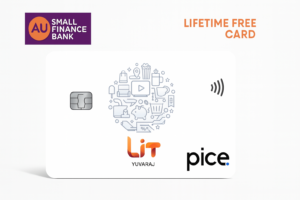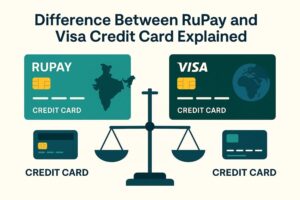How Can Under 18 Get a Credit Card in India?
- 28 Oct 25
- 9 mins
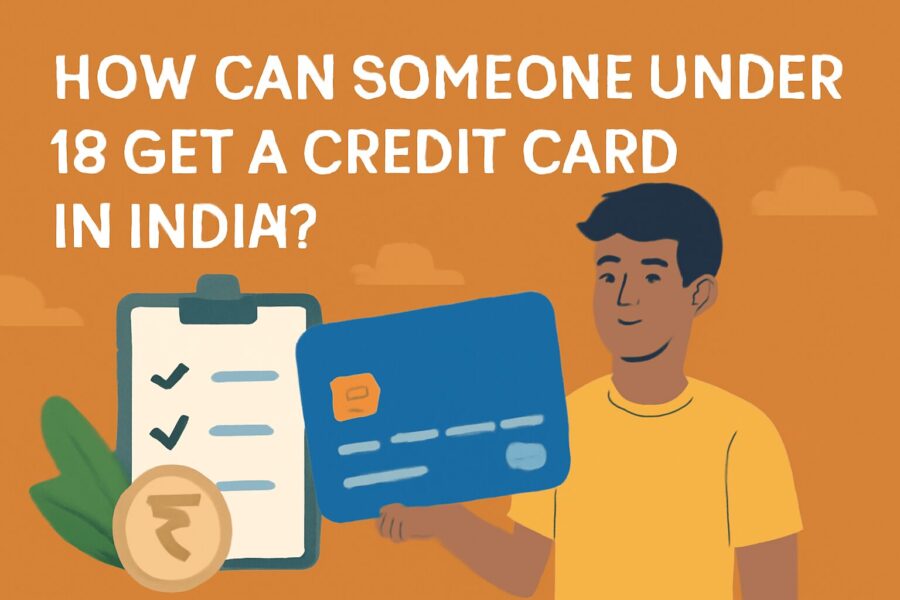
How Can Under 18 Get a Credit Card in India?
Key Takeaways
- While most banks require the users to be 18 years of age to apply for a credit card, teenagers in India have ways to use credit cards and begin their financial journey.
- Older teenagers can avail credit cards with a co-signer and as an add-on cardholder on their parents' credit card. The credit card, however, does come with certain limits.
- Teens can learn financially responsible spending and building credit history from an early age, though there are some risks associated with using a credit card.
- Parents can monitor spending habits by keeping low card limits and choosing cards that have low or no annual fees.
- Parents can also teach teens about debts, responsible spending, and financial independence by allowing add-on credit cards.
Many teenagers are willing to use a credit card, but they often wonder, "can under 18 get a credit card?". In the present day, the majority of banks require you to be at least 18 years of age to opt for a credit card.
However, teenagers can still choose a credit card by considering an add-on cardholder on their parents' existing account. There are many banks that allow teens between 15 and 16 years of age to use a supplementary card. This thereby lets them gain knowledge about managing money. Continue reading this blog to find out more.
Can Teenagers Under 18 Get Credit Cards?
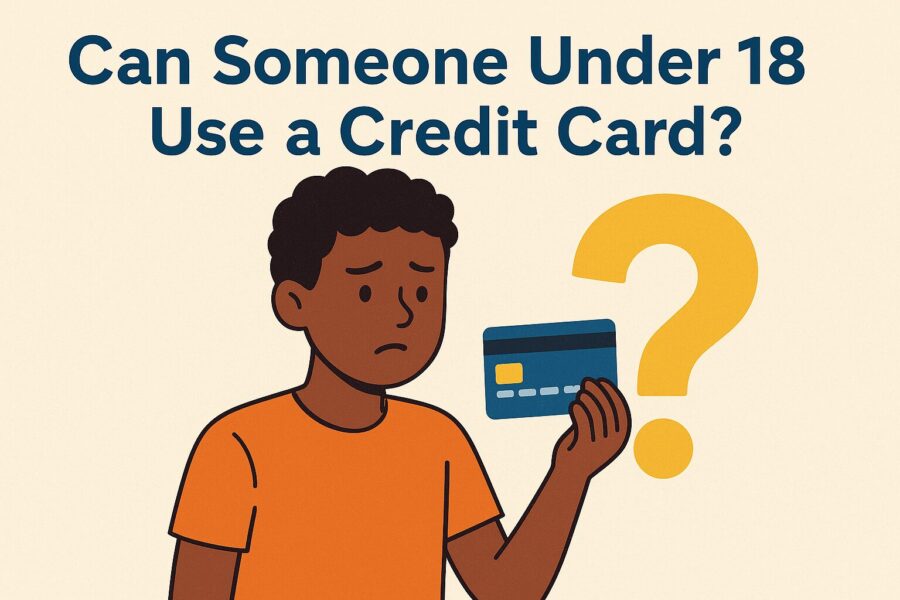
Teenagers under the age of 18 are not eligible to obtain credit cards on their own. However, there are some credit card issuers allowing minors under 18 years to become an authorised user on the already existing credit card account. Age eligibility, however, varies from one card issuer to another, but a few companies allow authorised users as young as 13 years.
Older teens, though, are eligible to be primary cardholders but still face restrictions until they turn 21 years old. Card issuers at times require a young person between 18 and 21 years to qualify for opening a credit card account once they provide:
1. Income Proof
Credit card issuers ensure that applicants are capable of repaying the balance amount on an account before extending a line of credit. Children under 18 might need to provide proof of income from any stable employment status to complete the application process.
2. A Co-Signer
If your older teenager has no stability in income, you can then go ahead and co-sign on the credit card. However, doing so will require you to pay the balance amount if your teenager is not capable.
Is It Beneficial for Teens to Have Credit Cards?
It is beneficial to provide teens with credit cards if they are capable of handling them responsibly. Let's find out the reasons why teens should have credit cards:
- Learn About Financial Responsibility
A credit card will allow teens to be educated on managing money. As an example, the banks such as ICICI and HDFC provide transaction alerts and expense tools to inform the teens on budgets and how to spend the money.
When guided in the right way, teens are taught how to differentiate between needs and wants, which will allow them to form the right financial habits at an early age.
- Building Credit History
An early use of a credit card, which has a parent account attached to it, can help teens establish a credit history. A good credit score would be vital in loan acquisition in the future, either for an education loan or a house loan.
Although credit information is mostly prevalent among adults, its responsible use among teens can establish a good foundation when they request their own credit card or loans once they reach the age of 18 years.
- Convenience
Credit cards provide ready and safe access to funds in case of emergency or normal spending, such as books, online classes or travelling. As an example, a teenager can use an add-on card when travelling to pursue higher studies or on internships, but this is monitored by parents, eliminating the burden of carrying money, as well as the need to depend on debit cards.
- Retain Control
Add-on cards enable parents to track their spending, limit it and get alerts if anything goes wrong. This will make sure that teens use the card in proper ways. By the end of each month, parents are able to review statements and can discuss financial independence options and mistakes with their children and make them learn how to avoid errors without facing such a harsh penalty.
How Can Teens Build Credit?
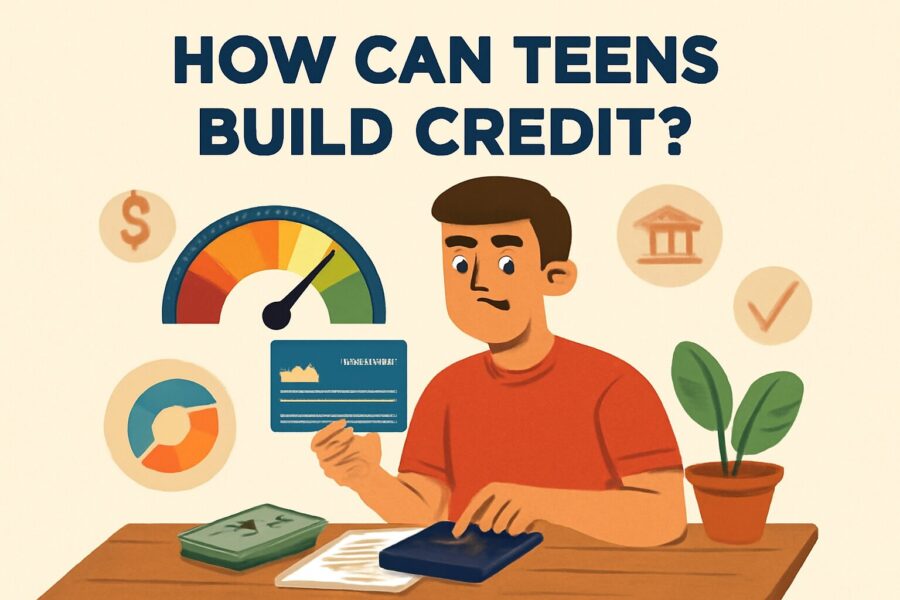
Building credit takes adequate time and guidance. Teens can start building credit at an early age, meeting the eligibility criteria by following the right steps. Here, parents play a crucial role in teaching their children healthy habits of saving money. Let's explore some simple ways:
1. Let Children Pay Their Own Bills
Provide your teens with the responsibility of paying small bills. This may be a phone plan, streaming service or gas money. When they put the money into their wallets, they are also taught about the virtue of keeping time. Late payments hurt credit. Making payments on time builds trust and discipline. It also trains them in learning how to handle funds monthly.
2. Show Your Teen Their Credit Report
A credit report demonstrates the degree of responsibility of an individual when using money. Read this report keeping your teen in front, and then also go for revision. Demonstrate to them the influence of payment history, balances and inquiries on their score. This brings the concept of credit nearer to reality.
3. Teach Them About Managing Debt
Your child might receive offers of student credit cards when he or she goes to college. Educate them on the use of credit. It is important to highlight that credit is not additional cash; it is finances that are borrowed. Only what they can pay in totality should be spent. Converse with them about rates of interest and how debt increases exponentially.
4. Encourage for a Better Budgeting and Saving Habit
Good habits help build good credit. Use the same to teach the teens to save a portion of their earnings and budget. Budgeting prevents them from getting into any debt. Teens should be taught to manage money smoothly.
💡To pay credit card bills in a smooth and efficient way, consider using the PICE App.
How to Choose the Right Credit Card for Teens?
Choosing the right credit card is essential for teens. The right card can instil good habits among teens and keep them safe from debt.
1. Set Low Card Limits
Start with a low card limit. A small limit ensures controlled spending. Teenagers can just spend as much as they can manage. This minimises the chances of excessive expenditure. It is also easier to clear the balance every month. First-time credit users are more comfortable with the low limits.
2. No Annual Charges
Choose a card that does not have any fees. Free cards are cheaper and easier to deal with. Teenagers will have the opportunity to concentrate on gaining the correct skills on how to use good credit without choosing to incur additional expenses.
Making good choices is useful to help teens get on the right path. It trains them on how to be responsible and prepares them for the realisation of a healthy financial life.
Tips to Follow for Parents While Introducing Credit Cards for Teens
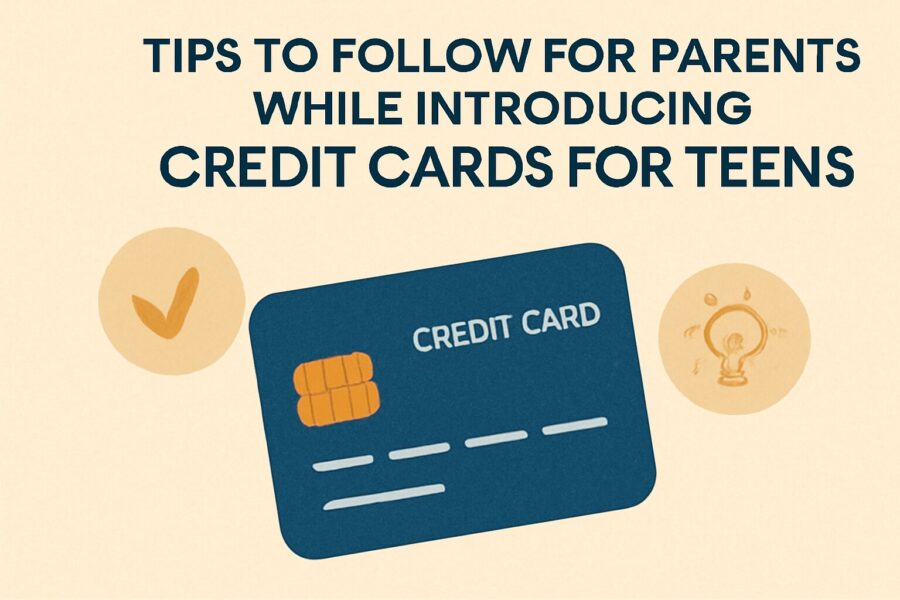
1. Set Limits
Always set spending limits and start with a low credit limit. This prevents the extravagant expenditure of teens. These can be altered by parents as teenagers become responsible.
2. Monitor Spending Habits
To build responsible habits, it is important to monitor your teen’s spending. Many credit cards offer online trackers and notifications, helping you supervise effectively. This not only keeps teens aware of their expenses but also prevents errors and unnecessary waste.
3. Teach Budgeting
Help teenagers understand the value of budgeting by guiding them to align spending with their needs, wants and savings. Show them how to pay off credit balances on time to avoid debt. Budgeting creates structure, promotes smart decisions and they should be encouraged to track all purchases for better awareness.
4. Talk About Credit Responsibility
Teach your teens that credit is borrowed money, not free spending. Help them understand how interest, late fees and credit scores work. These concepts are crucial, as mistakes made now can impact their financial future, including loan approvals, job opportunities and more.
Conclusion
If you are wondering 'can under 18 get a credit card?', the answer is no. However, teenagers can choose a credit card with parental consent as an add-on user. This allows them to learn financial responsibility.
It also helps teens build good financial habits for the future, especially when they apply for their own credit card at 18. With proper guidance, they can use this add-on card as a learning tool, gaining real-world experience in managing credit responsibly.
 By
By 







